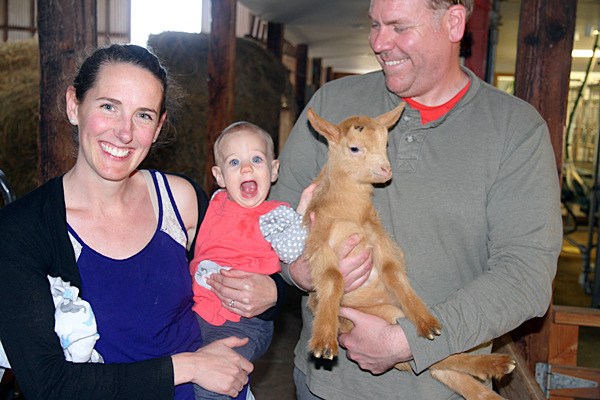Kim and Brian Christensen are building their life around kids, whether human or otherwise.
The Oak Harbor couple, married for eight years, is raising three young children and 70 goats on their 300-acre farm.
For the past three years, they’ve poured their efforts into selling raw goat milk, goat-milk soap and other beauty products under the name North Whidbey Farm.
It’s been a slog, and it’s not yet profitable, but they remain optimistic, they said recently.
“We think about giving it up often, but we’ve just kept on plowing on with the idea,” said Australian-born Kim, 35. “We just need to work smarter instead of harder, and the idea is there’s money to be made in volume.”
Added Brian, 42, “I’ve invested way too much time and work to think about it not working.”
“I am committed to these goats.”
NEITHER OF the university grads has training in farming. She’s a teacher, he’s a biologist. But after knocking around Hawaii, Australia and Kirkland for a few years after their marriage, their thoughts turned to the farm started in the 1930s by Brian’s great-grandfather, Henning Christensen, after he came west from the Dakotas with eight siblings.
Brian grew up in a house next to the farm, which raised Top Springer cattle.
“I was looking into doing something with the farm, and I never much liked cows, but I was impressed with all the things you can do with goats, so I thought, ‘Well, let’s give goats a shot,’ ” Brian recalled.
They bought 20 does and one buck, all of the Oberhasli breed, a distinctively colored Swiss strain. Oberhasli does are said to be dependable sources of milk, and the bucks are used as pack animals because of their strength and gentle demeanor, according to the Livestock Conservancy.
RECENTLY, THE Christen-sens started interbreeding the Oberhaslis with small, docile Guernseys.
The next year, all the does were pregnant. The first use Kim made of the surplus milk was as an ingredient in soap. Goat-milk soap is claimed to be ideal for people with dry or sensitive skin, or for those with skin conditions such as eczema and psoriasis. North Whidbey Farm offers the soap in a large variety of scents, as well as unscented and oatmeal, at $6.50 to $8 a bar.
The soap, as well as a variety of salves and other beauty products, are available online and at 3 Sisters Market in San de Fuca and the Skagit Valley Food Co-op in Mount Vernon.
Kim is working on a goat-milk lotion that uses a natural preservative.

IN ORDER to take the next step in their plan — selling raw milk — the couple had to pass inspections and get a special license. They installed $20,000 worth of milking equipment and started offering raw milk for sale at their farm and at The Goose in Bayview, 3 Sisters and the Skagit Valley Food Co-op.
Major food stores wouldn’t carry it because their insurance wouldn’t allow it, Kim said.
Unpasteurized milk can carry bacteria such as Salmonella, E. coli and Listeria, according to the Food and Drug Administration. It is banned in seven states but legal in Washington and many other states, according to the Farm-to-Consumer Legal Defense Fund. Raw-milk advocates say it’s hormone-free, tastes good, is easier to digest, provides some health benefits and offers a direct connection to its supplier.
LAST YEAR, the farm’s gross receipts were in the low five figures. With three children under five, the Christensens depend on a real estate investment to stay afloat, though they pay no mortgage on the farm, they said.
This year the couple plans to expand their outlets for raw milk, including some farmers markets. Whole Foods in Bellingham has agreed to carry it.
Brian wants to get into cheese-making. Kim says she could double her soap production.
They are moving slowly so as to stay out of debt. Eventually, they’d like their business to be both self-sustaining and profitable.
THEY’RE WELL on their way to the first goal: they grow all their own goat feed and plow the goat poop into their fields in lieu of chemical fertilizer.
“I want to figure out how to make the best use of goats,” Brian said. “Can we butcher them? Sell the hides? We want to do things as naturally as we can, with a good return.”
Not that he has anything against the creatures, 40 of whose young offspring were cavorting adorably in a pen recently. “They are easy to handle, they don’t run you over like cows, they’re not crazy, they are very straightforward, unlike sheep.”
“They are appealing animals.”
North Whidbey Farm is closed to the public, though soap and milk may be picked up by appointment. For information, visit http://www.northwhidbeyfarm.com/



